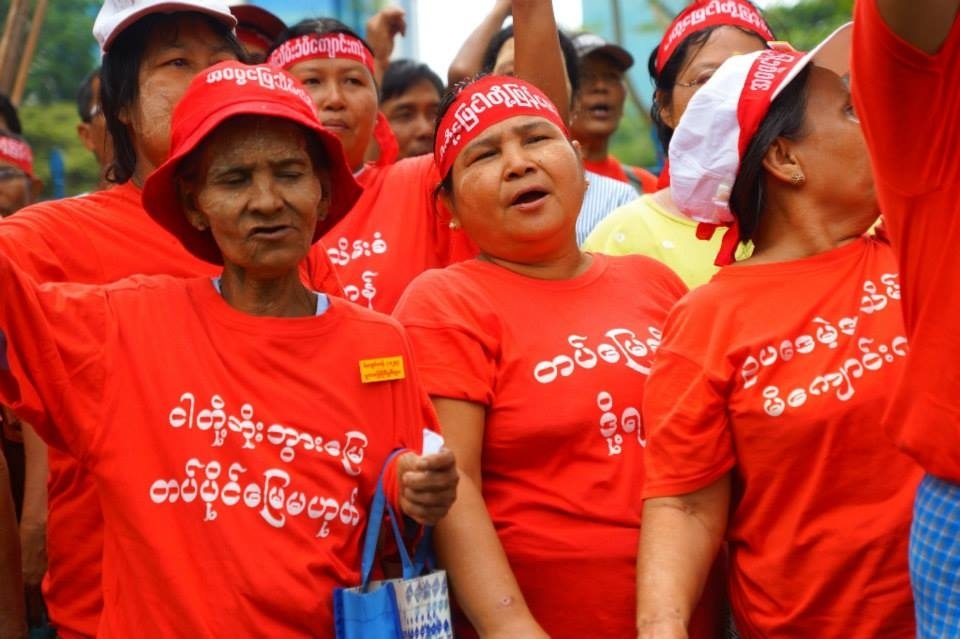Michaungkan Protestors Stand Fast as Deadline Passes
Originally appeared in Democratic Voice of Burma
October 4, 2014 As Saturday dawned, dozens of protestors from the Rangoon suburb of Michaungkan, who have been conducting a vigil outside Maha Bandula Park in the city centre to protest land grabs, were still occupying the public street despite a 3 October deadline ordered by local police to dismantle their camp and leave.
As Saturday dawned, dozens of protestors from the Rangoon suburb of Michaungkan, who have been conducting a vigil outside Maha Bandula Park in the city centre to protest land grabs, were still occupying the public street despite a 3 October deadline ordered by local police to dismantle their camp and leave.
As Friday’s deadline struck, police did not appear at the protest site where many feared that force might once again be used to disperse the villagers.
Many of the protestors were in a defiant mood as they spoke to DVB reporters from their protest camp on Maha Bandula Road, just 400m west of Sule Pagoda and Rangoon City Hall.
“We are staying until our demands are met!” shouted one Michaungkan resident, pumping her fist to the sky.
Another protestor, Saw Sandar, said that the municipal authorities had earlier approached and asked them to take down their shelters because they were blocking a footpath. “We told them we could not do that as we have several elderly people here who need protection from the weather,” she said.
Asked what the protestors would do if police were called in to remove them, she replied, “We don’t have any weapons and we will not fight back.”
Nay Nwe, a villager who said she has been involved in the protest from the beginning, said the authorities have handled the situation all wrong.
“We are peaceful demonstrators waiting for a response [from the local government], and a resolution to the matter,” she said. “I think they will come and use force to remove us in one or two days. But this is not the way it should be handled. We will not accept this as a solution.”
More than 100 residents of Thingyangun’s Mighaungkan village have participated in a series of sit-ins and other demonstrations demanding the return of land they say was confiscated by the Burmese military in 1990.
A group of about 200 had initially set up camp at Thingyangun’s Myasaryan Pagoda in late November 2013. About one week after the demonstrations began, on 2 December, approximately 400 villagers showed up at the site to receive funeral rites from local monks, proclaiming that they were “ready to die” for their land.
Shortly after, demonstrators reported that they were attacked by a group of thugs who claimed to be military cleaning personnel. Within days of the incident, which reportedly left at least eight people injured, police issued an eviction order demanding that the site be cleared by 9 December.
Protest leaders and the Land Investigation Commission negotiated a three-month hiatus of the occupation after the commission promised to deliver results within that time.
Parliamentarian and Commission member Aung Thein Linn told DVB in December that the government was committed to solving the dispute. “Otherwise,” he said, “it will be damaging to our country’s image, especially while the SEA Games are being held.”
The country was at that time hurrying to prepare for a major regional sporting event, the Southeast Asian Games, which drew international attention and visitors.
Three months later and still unsatisfied, about 100 protestors resumed the sit-in, this time bringing their grievances to Maha Bandula Park in downtown Rangoon, across the street from City Hall.
One week later, on 30 March, they were forcibly dispersed in an early morning raid by city officials and dozens of plain-clothed men.
The demonstrators vowed to keep fighting and have maintained a presence at the park ever since.
In August, a 72-year-old protestor died at the encampment after 138 days of her sit-in. At that time, her fellow activists reiterated that nothing would make them accept the loss of their land, even death.
During the military regime, land was routinely confiscated by the government for state use. Since the reforms began in 2011, protests have been increasingly common all across Burma as villagers have attempted to reclaim lost assets.
New land legislation introduced in early 2012 has met major criticism, with some claiming that the new laws legitimise government and corporate acquisition while offering little protection for individuals. A government commission established in 2012 has begun fielding Burma’s thousands of land-grab claims but has yet to provide satisfactory recourse.
View the original article here.
Tags: Burma Army, Burma Government, Land Confiscation, Michaungkan, ProtestThis post is in: People's Voices
Related Posts21st Century Panglong Conference Reaffirms Obstacles to Peace
Torture, extrajudicial killing, and use of civilians as human shields by Burma Army during new offensive against SSPP/SSA near Upper Yeywa dam site in Kyaukme
Time for a Fresh Start for Genuine Peace
An Open Letter to World Leaders on the Fourth Anniversary of The Resumption of War Calling Urgently for Humanitarian Aid for The Internally Displaced People of Northern Burma
The Burma Government Must Stop Condoning Sexual Violence in Conflict Areas









 All posts
All posts